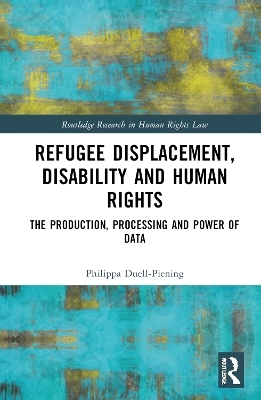
Refugee Displacement, Disability and Human Rights
Routledge (Verlag)
978-1-032-82771-1 (ISBN)
- Noch nicht erschienen (ca. Februar 2025)
- Versandkostenfrei
- Auch auf Rechnung
- Artikel merken
The study provides detailed explorations of the legal and practical demands of article 31, how these have been interpreted, and the practice of human rights research with marginalised communities. It describes the history of the article’s drafting in detail, uncovering the tensions at its heart today. This analysis provides the foundations for an alternative doctrinal reading of the obligations in article 31 and an exploration of a potential group right. The book's detailed analysis is assisted by a new conceptual framework that illustrates the relationship between visibility and power. The work demonstrates that data is not inert but powerful and may be used in ways that are helpful and harmful to rights holders. Through closely examining disability human rights data practices in refugee contexts, it concludes that human rights protections are being ignored in the urgency to create more data to identify and address inequality. The author identifies immediate actions that may be taken to remediate current practices.
The book will be an invaluable resource for academics, researchers and policy-makers working in disability studies, human rights law, refugee and migration studies, technology and society.
Philippa Duell-Piening, PhD, is a socio-legal researcher specialising in the human rights of people who are refugees with disability. Before transitioning to academia, Philippa coordinated the Victorian Refugee Health Network at the Victorian Foundation for Survivors of Torture, where she led initiatives in health sector development and government engagement to reduce health inequalities and improve access to healthcare services for people who are refugees. Earlier in her career, she worked as an occupational therapist and case manager in mental health services in Australia and the UK. Philippa has also worked in forced migration contexts, including Timor-Leste in 2002 and the Thai-Myanmar border in 2012. Philippa holds a PhD from Melbourne Law School, a Graduate Diploma in International Law, a Master’s in Community and International Development, and a Bachelor of Occupational Therapy. Drawing on her interdisciplinary expertise across international law, community development, and health, Philippa develops innovative socio-legal research methods that challenge traditional power dynamics in research, working collaboratively with communities to better understand the drivers of marginalisation and the levers for change.
1. Introduction Part I: Knowledge Production and Control 2. Participatory Treaty Interpretation 3. Data and Power Part II: CRPD Article 31 4. Drafting CRPD Article 31 5. Interpreting CRPD Article 31 Part III: CRPD Article 31 in Refugee Contexts 6. People with Disability in Refugee Contexts as Rights-Holders and Data Subjects 7. A Balancing Act: Mitigating the Harms of Human Rights Data Production and Processing 8. Conclusion
| Erscheint lt. Verlag | 25.2.2025 |
|---|---|
| Reihe/Serie | Routledge Research in Human Rights Law |
| Zusatzinfo | 1 Tables, black and white; 7 Line drawings, black and white; 2 Halftones, black and white; 9 Illustrations, black and white |
| Verlagsort | London |
| Sprache | englisch |
| Maße | 156 x 234 mm |
| Themenwelt | Recht / Steuern ► EU / Internationales Recht |
| Recht / Steuern ► Öffentliches Recht ► Verfassungsrecht | |
| Recht / Steuern ► Öffentliches Recht ► Völkerrecht | |
| Sozialwissenschaften ► Soziologie | |
| ISBN-10 | 1-032-82771-8 / 1032827718 |
| ISBN-13 | 978-1-032-82771-1 / 9781032827711 |
| Zustand | Neuware |
| Haben Sie eine Frage zum Produkt? |
aus dem Bereich


